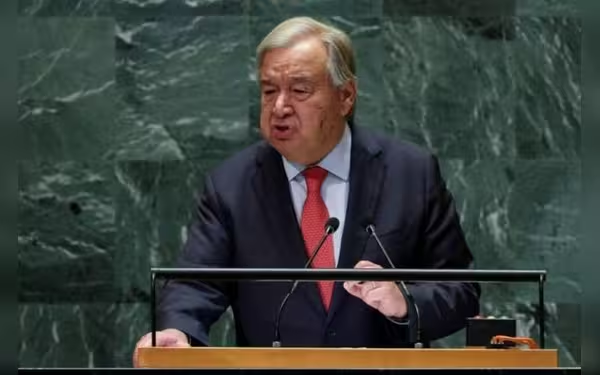Saturday, November 16, 2024 05:30 PM
UN Chief Warns Netanyahu on UNRWA Operations in Occupied Palestine
- Blocking UNRWA would lead to humanitarian catastrophe.
- 600,000 children risk losing education without UNRWA.
- Gaza's situation described as a 'death spiral' by Guterres.
 Image Credits: urdupoint
Image Credits: urdupointUN Chief Guterres warns Netanyahu that blocking UNRWA's work in Palestine could lead to a humanitarian catastrophe.
The ongoing conflict in the Middle East has reached a critical juncture, particularly concerning the humanitarian situation in the occupied Palestinian territories. Recently, UN Secretary-General Antonio Guterres expressed grave concerns regarding a draft legislation proposed by the Israeli government. This legislation aims to prevent the United Nations Relief and Works Agency for Palestine Refugees in the Near East (UNRWA) from conducting its essential humanitarian operations. Guterres has warned that such a move would lead to a "catastrophe" for the already suffering population in Gaza and the broader region.
In a letter addressed to Israeli Prime Minister Benjamin Netanyahu, Guterres highlighted the dire consequences of this legislation. He stated, "Such a measure would suffocate efforts to ease human suffering and tensions in Gaza, and indeed, the entire Occupied Palestinian Territory. It would be a catastrophe in what is already an unmitigated disaster." This statement underscores the critical role that UNRWA plays in providing food, shelter, and healthcare to those in need.
The Israeli parliament has already given preliminary approval to a bill that labels UNRWA as a terrorist organization, a claim that Israeli leaders have made in connection with accusations of collaboration with Hamas. If this legislation is passed, it could severely disrupt the international humanitarian response in the region. Guterres emphasized that isolating one UN agency from others is not feasible, as it would hinder coordination efforts that protect UN convoys and shelters serving hundreds of thousands of people.
Without UNRWA, the delivery of essential services would come to a standstill, leaving 600,000 children without access to education and risking the future of an entire generation. Furthermore, many health, education, and social services would cease to exist in the occupied West Bank, including East Jerusalem. Guterres pointed out that such legislation would contradict the UN Charter and violate Israel's obligations under international law.
The situation in Gaza is deteriorating rapidly, with Guterres describing it as being in a "death spiral." He noted the intensification of Israeli military operations, which have led to attacks on residential areas and hospitals, forcing civilians to evacuate to overcrowded and unsafe regions. He stated, "Ordering civilians to evacuate does not keep them safe if they have no safe place to go and no shelter, food, medicine, or water." This highlights the tragic reality faced by many innocent civilians caught in the crossfire.
As the conflict continues, the humanitarian crisis deepens. Supplies in southern Gaza are dwindling, and aid is severely restricted, with only one unsafe route available for humanitarian assistance. Guterres has warned that the conflict risks spreading beyond Gaza, with rising violence in the West Bank and tensions in Lebanon threatening the stability of the entire region. He aptly described the Middle East as a "powder keg with many parties holding the match."
The potential blocking of UNRWA's operations poses a significant threat to the already fragile humanitarian situation in the occupied Palestinian territories. The international community must pay close attention to these developments and advocate for the protection of civilians and the continuation of essential humanitarian services. The path to peace and stability in the region hinges on the ability to address the urgent needs of those affected by this ongoing conflict.













